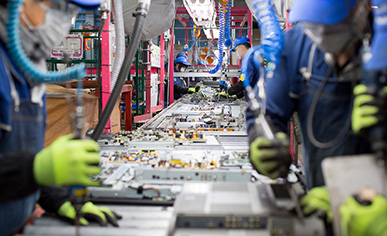 With the “Panasonic Green Impact” strategy, the company announced its programs to lead the call for reductions in CO2 emissions across the many areas it is engaged, creating an impact that accelerates a society-wide energy revolution. Panasonic Corporation has made a commitment to achieving net zero CO2 emissions at all its operating companies by 2030 as a milestone to realizing the “Panasonic Environmental Vision 2050” formulated in 2017. Many are the company’s sustainable initiatives, among which the resin recycling from home appliances.
With the “Panasonic Green Impact” strategy, the company announced its programs to lead the call for reductions in CO2 emissions across the many areas it is engaged, creating an impact that accelerates a society-wide energy revolution. Panasonic Corporation has made a commitment to achieving net zero CO2 emissions at all its operating companies by 2030 as a milestone to realizing the “Panasonic Environmental Vision 2050” formulated in 2017. Many are the company’s sustainable initiatives, among which the resin recycling from home appliances.
To make the best possible use of resin found in many home appliances, Panasonic is expanding the applications of resin recycled from obsolete home appliances. Panasonic’s proprietary technology allows for rapid classification and collection of three types of resin in highly purified form. The resin retrieved through this process is reborn as part of new products. Panasonic is working to develop technologies for the efficient collection and recycling of these kinds of resources, while also minimizing resource investment at the manufacturing stage and improving quality across every process in the resource cycle.
In the Panasonic Eco Technology Center (Petec), a recycling facility established in Hyogo Prefecture, Japan in 2000. At Petec, Panasonic is recovering valuable resources such as plastic, iron and copper at a high degree of purity from end-of-life televisions, air conditioners, refrigerators and washing machines. Resins extracted with high purity are conveyed to begin their new role as recycled materials.
«The recycled resin is in internal parts for air conditioners, refrigerators and inductive heating (IH) cooking heaters – the company explains -. The vacuum insulation that uses glass wool recycled from television cathode-ray tubes (CRTs) is used in new refrigerators. By expanding these kinds of resources-recycling technologies from domestic use in Japan to the world at large, Panasonic aims to contribute to the achievement of the UN’s Sustainable Development Goals (SDGs), and to the realization of a sustainable society».




